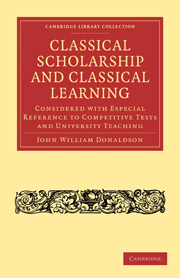 Classical Scholarship and Classical Learning
Classical Scholarship and Classical Learning Longer notes and authorities
Published online by Cambridge University Press: 05 October 2010
Summary
The following extracts from Professor Amos's Report of the Class of English Law in the University of London, for the Session 1828—1829, will show the extent of the legal studies, which I commenced at the age of fourteen and pursued for three years, and the value of the certificate, which I obtained together with the late Solicitor-General for Ireland and two other gentlemen at that time practising as Conveyancers or Special Pleaders:
“This assembly has already been informed, in the general statement read by the secretary, of an important circumstance relative to this class, which is, the number of the students. This has exceeded the most sanguine expectations of the members of the council. The words ‘English Law’ still remain affixed on the door of a little lecture-room, which, it was originally conceived, would be adequate to our use, but which we outgrew in the first week of the course. And, although we are now only completing our first session, the class of English, law amounts, in number, to a-hundred-and-forty-four.
“The attendance of the class in the lecture-room has been exceedingly numerous, every evening, without a single exception, from the beginning of the course to the end.
“The development of the principles of English law, from the importance of the subject, has produced among the students, in the hours of lecture, an universal earnestness of attention, which cannot fail to have made a strong impression upon all who have witnessed it, and to have excited their admiration.
- Type
- Chapter
- Information
- Classical Scholarship and Classical LearningConsidered with Especial Reference to Competitive Tests and University Teaching, pp. 207 - 259Publisher: Cambridge University PressPrint publication year: 2010


